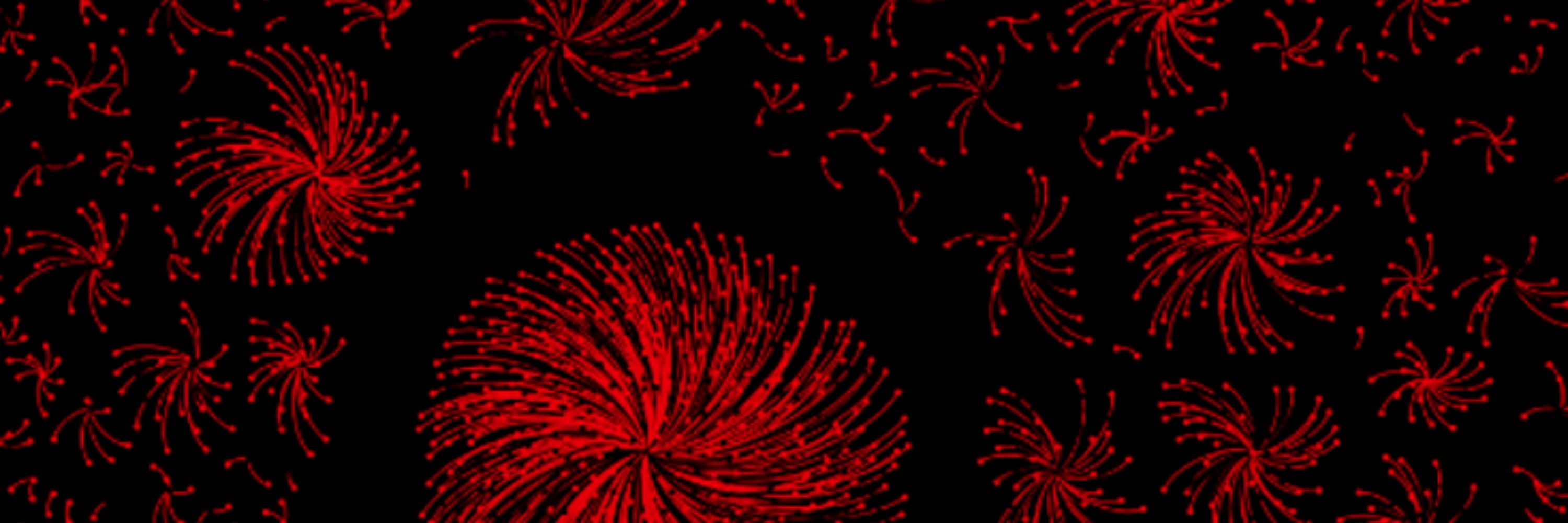
Curtis Puryear
@curtispuryear.bsky.social
Assistant Professor at UNCW studying morality, politics, and intergroup conflict.
puryearc@uncw.edu
http://curtispuryear.com
puryearc@uncw.edu
http://curtispuryear.com
Pinned
Curtis Puryear
@curtispuryear.bsky.social
· Jul 22
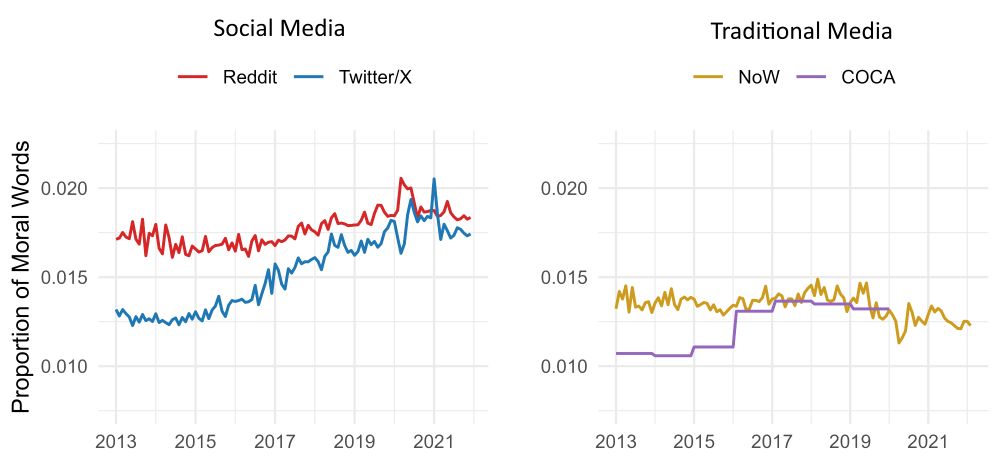
New preprint! We developed new measurement tools to examine moralization in ~2B Twitter/X & Reddit posts and ~5M traditional media texts.
Key finding: moralization increased markedly on social media from 2013-2021; more than traditional media; associated with multiple user dynamics
🧵👇
Key finding: moralization increased markedly on social media from 2013-2021; more than traditional media; associated with multiple user dynamics
🧵👇
Reposted by Curtis Puryear
Do ethnic minority interest parties grow through programs, or people? Schaaf, Otjes & Spierings show that DENK’s support in the Netherlands stems mainly from personal & religious networks, while online ties matter less. #ComparativePolitics
Read more:
link.springer.com/article/10.1...
Read more:
link.springer.com/article/10.1...

The Role of Networks in Mobilization for Ethnic Minority Interest Parties - Political Behavior
Recently, parties that are run by and for ethnic minority citizens with a migration background have become more prominent. They can be considered a manifestation of ethnic political segregation. A key example of such a party is DENK in the Netherlands. So far, the explanatory literature has focused on how programmatic considerations drives voting for these parties. Other factors, such as the role of social networks in mobilization, have received limited testing and limited exploration in more detail. Furthermore, the literature on social networks is mainly based on majority populations. To inform our understanding of the role of social networks in voting (in general but also particularly among ethnic minority communities and for ethnic minority interest parties) this paper analyzes the voting behavior for DENK focusing on the role of personal, online and religious networks. The paper uses both qualitative interviews (with bicultural youth in the third largest city of the Netherlands in 2022) and quantitative surveys (the 2021 Dutch Ethnic Minority Electoral Study). Our analysis points to the importance of religious and personal networks for voting for DENK, whereas online networks appear to be less relevant.
link.springer.com
October 1, 2025 at 11:45 PM
Do ethnic minority interest parties grow through programs, or people? Schaaf, Otjes & Spierings show that DENK’s support in the Netherlands stems mainly from personal & religious networks, while online ties matter less. #ComparativePolitics
Read more:
link.springer.com/article/10.1...
Read more:
link.springer.com/article/10.1...
Reposted by Curtis Puryear
Intervening on a central node in a network likely does little given that its connected neighbors will "flip it back" immediately. Happy to see this position supported now.
"Change is most likely [..] if it spreads first among relatively poorly connected nodes."
www.nature.com/articles/s41...
"Change is most likely [..] if it spreads first among relatively poorly connected nodes."
www.nature.com/articles/s41...

Transformation starts at the periphery of networks where pushback is less - Scientific Reports
Scientific Reports - Transformation starts at the periphery of networks where pushback is less
www.nature.com
September 29, 2025 at 9:16 AM
Intervening on a central node in a network likely does little given that its connected neighbors will "flip it back" immediately. Happy to see this position supported now.
"Change is most likely [..] if it spreads first among relatively poorly connected nodes."
www.nature.com/articles/s41...
"Change is most likely [..] if it spreads first among relatively poorly connected nodes."
www.nature.com/articles/s41...
Reposted by Curtis Puryear
Depolarization is not "a scalable solution for reducing societal-level conflict.... achieving lasting depolarization will likely require....moving beyond individual-level treatments to address the elite behaviors and structural incentives that fuel partisan conflict" www.pnas.org/doi/10.1073/...

September 23, 2025 at 7:59 PM
Depolarization is not "a scalable solution for reducing societal-level conflict.... achieving lasting depolarization will likely require....moving beyond individual-level treatments to address the elite behaviors and structural incentives that fuel partisan conflict" www.pnas.org/doi/10.1073/...
Reposted by Curtis Puryear
I mean, we are living in two different realities now, and this really hasn't always been the case.

September 22, 2025 at 6:15 PM
I mean, we are living in two different realities now, and this really hasn't always been the case.
Reposted by Curtis Puryear
I’m very excited to share that my paper “Cleavage theory meets civil society: A framework and research agenda” with @eborbath.bsky.social & Swen Hutter has now been published online in @wepsocial.bsky.social (w/ open access funding thanks to @wzb.bsky.social!)
www.tandfonline.com/doi/full/10....
www.tandfonline.com/doi/full/10....

August 28, 2025 at 1:25 PM
I’m very excited to share that my paper “Cleavage theory meets civil society: A framework and research agenda” with @eborbath.bsky.social & Swen Hutter has now been published online in @wepsocial.bsky.social (w/ open access funding thanks to @wzb.bsky.social!)
www.tandfonline.com/doi/full/10....
www.tandfonline.com/doi/full/10....
Reposted by Curtis Puryear
New preprint 🚨
Cognitive bottlenecks make LLMs more morally aligned with people 🧠🤖
We made AI “think” more like people by narrowing its focus to a few key moral cues.
This AI better predicted people’s moral judgments & was more trusted.
🧵 ⬇️
Cognitive bottlenecks make LLMs more morally aligned with people 🧠🤖
We made AI “think” more like people by narrowing its focus to a few key moral cues.
This AI better predicted people’s moral judgments & was more trusted.
🧵 ⬇️

August 25, 2025 at 4:54 PM
New preprint 🚨
Cognitive bottlenecks make LLMs more morally aligned with people 🧠🤖
We made AI “think” more like people by narrowing its focus to a few key moral cues.
This AI better predicted people’s moral judgments & was more trusted.
🧵 ⬇️
Cognitive bottlenecks make LLMs more morally aligned with people 🧠🤖
We made AI “think” more like people by narrowing its focus to a few key moral cues.
This AI better predicted people’s moral judgments & was more trusted.
🧵 ⬇️
Reposted by Curtis Puryear
Ever stared at a table of regression coefficients & wondered what you're doing with your life?
Very excited to share this gentle introduction to another way of making sense of statistical models (w @vincentab.bsky.social)
Preprint: doi.org/10.31234/osf...
Website: j-rohrer.github.io/marginal-psy...
Very excited to share this gentle introduction to another way of making sense of statistical models (w @vincentab.bsky.social)
Preprint: doi.org/10.31234/osf...
Website: j-rohrer.github.io/marginal-psy...



August 25, 2025 at 11:49 AM
Ever stared at a table of regression coefficients & wondered what you're doing with your life?
Very excited to share this gentle introduction to another way of making sense of statistical models (w @vincentab.bsky.social)
Preprint: doi.org/10.31234/osf...
Website: j-rohrer.github.io/marginal-psy...
Very excited to share this gentle introduction to another way of making sense of statistical models (w @vincentab.bsky.social)
Preprint: doi.org/10.31234/osf...
Website: j-rohrer.github.io/marginal-psy...
Reposted by Curtis Puryear
The CHES EU team has published a new research note in @electoralstudies.bsky.social describing some trends across the 25 years now covered by our trend file and exploring two new items included in the 2024 wave of the survey: doi.org/10.1016/j.el...
Here’s a summary thread:
1/
Here’s a summary thread:
1/

August 14, 2025 at 9:01 AM
The CHES EU team has published a new research note in @electoralstudies.bsky.social describing some trends across the 25 years now covered by our trend file and exploring two new items included in the 2024 wave of the survey: doi.org/10.1016/j.el...
Here’s a summary thread:
1/
Here’s a summary thread:
1/
Reposted by Curtis Puryear
We live in an era of democratic backsliding. But the terminology of "backsliding" isn't up to the task of making sense of the deep crisis of liberal democracy around the world. I've just finished a working paper that lays out what I think is going on.
tl;dr it's about the state and society
🧵
tl;dr it's about the state and society
🧵
State, Society, and the Politics of Democratic Backsliding
Recent scholarship on democratic backsliding has focused on measuring its global prevalence and identifying the causal processes and mechanisms that produce or
papers.ssrn.com
July 23, 2025 at 2:10 PM
We live in an era of democratic backsliding. But the terminology of "backsliding" isn't up to the task of making sense of the deep crisis of liberal democracy around the world. I've just finished a working paper that lays out what I think is going on.
tl;dr it's about the state and society
🧵
tl;dr it's about the state and society
🧵
Reposted by Curtis Puryear
We know that a consensus of opinions is persuasive, but how reliable is this effect across people and types of consensus, and are there any kinds of claims where people care less about what other people think? This is what we tested in our new(ish) paper in @psychscience.bsky.social
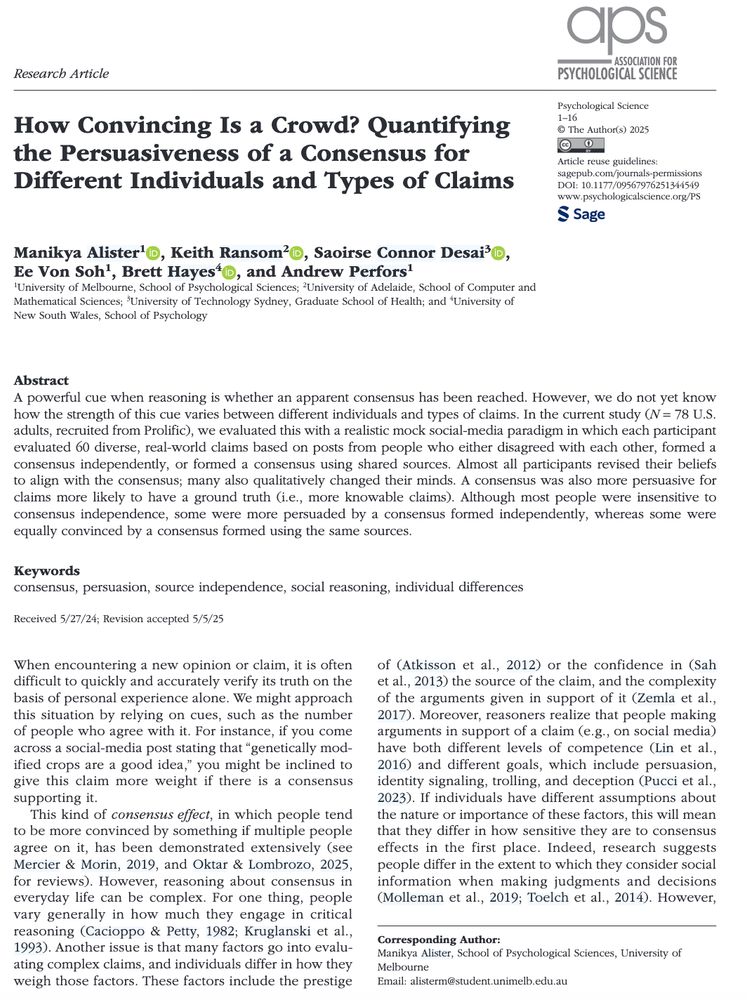
August 10, 2025 at 11:12 PM
We know that a consensus of opinions is persuasive, but how reliable is this effect across people and types of consensus, and are there any kinds of claims where people care less about what other people think? This is what we tested in our new(ish) paper in @psychscience.bsky.social
Reposted by Curtis Puryear
I have a new article out at @polstudies.bsky.social. In "Electoral Hope", I make the case that supposedly irrational "wishful thinking" is actually a crucial part of how voters make rational sense of their role in democracies.
OA link: doi.org/10.1177/0032...
OA link: doi.org/10.1177/0032...

August 6, 2025 at 1:08 PM
I have a new article out at @polstudies.bsky.social. In "Electoral Hope", I make the case that supposedly irrational "wishful thinking" is actually a crucial part of how voters make rational sense of their role in democracies.
OA link: doi.org/10.1177/0032...
OA link: doi.org/10.1177/0032...
Reposted by Curtis Puryear
👅Can moral language boost pro-immigrant messages and be as effective as anti-immigrant messages?
➡️ @kristinabsimonsen.bsky.social shows that pro-immigrant actors are not always bound to lose against the anti-immigrant side www.cambridge.org/core/journal... #FirstView #OpenAccess
➡️ @kristinabsimonsen.bsky.social shows that pro-immigrant actors are not always bound to lose against the anti-immigrant side www.cambridge.org/core/journal... #FirstView #OpenAccess


September 24, 2024 at 6:51 AM
👅Can moral language boost pro-immigrant messages and be as effective as anti-immigrant messages?
➡️ @kristinabsimonsen.bsky.social shows that pro-immigrant actors are not always bound to lose against the anti-immigrant side www.cambridge.org/core/journal... #FirstView #OpenAccess
➡️ @kristinabsimonsen.bsky.social shows that pro-immigrant actors are not always bound to lose against the anti-immigrant side www.cambridge.org/core/journal... #FirstView #OpenAccess
Reposted by Curtis Puryear
🚨 New paper in Science Advances @science.org
Can changing how we argue about politics online improve the quality of replies we get?
T HeideJorgensen, @gregoryeady.bsky.social & I use an LLM to manipulate counter-arguments to see how people respond to different approaches to arguments
Thread 🧵1/n
Can changing how we argue about politics online improve the quality of replies we get?
T HeideJorgensen, @gregoryeady.bsky.social & I use an LLM to manipulate counter-arguments to see how people respond to different approaches to arguments
Thread 🧵1/n
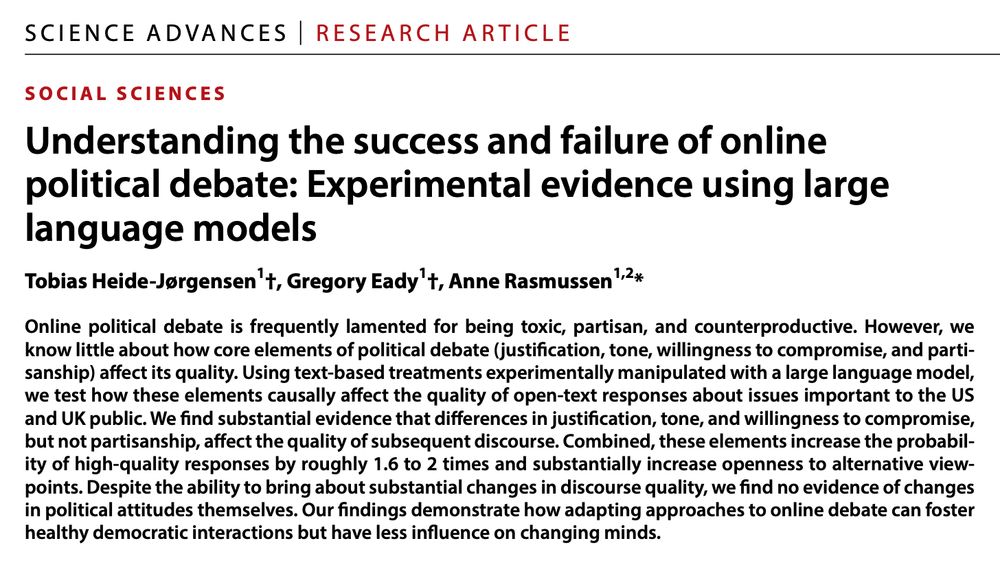
July 28, 2025 at 8:37 AM
🚨 New paper in Science Advances @science.org
Can changing how we argue about politics online improve the quality of replies we get?
T HeideJorgensen, @gregoryeady.bsky.social & I use an LLM to manipulate counter-arguments to see how people respond to different approaches to arguments
Thread 🧵1/n
Can changing how we argue about politics online improve the quality of replies we get?
T HeideJorgensen, @gregoryeady.bsky.social & I use an LLM to manipulate counter-arguments to see how people respond to different approaches to arguments
Thread 🧵1/n
Reposted by Curtis Puryear
I have a new paper on "The Psychology of Virality" with @steverathje.bsky.social
We explain how similar psychological processes (eg preferential attention to negativity, social motives, etc.) drive the spread of information across online and offline contexts: www.sciencedirect.com/science/arti...
We explain how similar psychological processes (eg preferential attention to negativity, social motives, etc.) drive the spread of information across online and offline contexts: www.sciencedirect.com/science/arti...
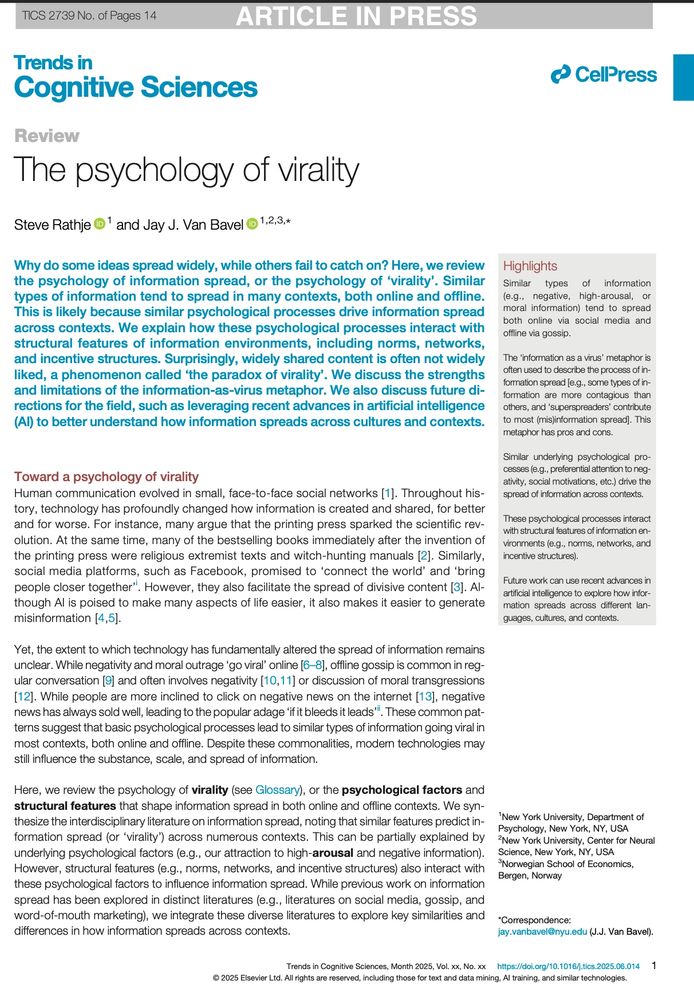
July 23, 2025 at 8:22 PM
I have a new paper on "The Psychology of Virality" with @steverathje.bsky.social
We explain how similar psychological processes (eg preferential attention to negativity, social motives, etc.) drive the spread of information across online and offline contexts: www.sciencedirect.com/science/arti...
We explain how similar psychological processes (eg preferential attention to negativity, social motives, etc.) drive the spread of information across online and offline contexts: www.sciencedirect.com/science/arti...
Reposted by Curtis Puryear
Really enjoyed my conversation with @chrislhayes.bsky.social about how protests can shape public opinion. He also generously invited me to share a bit of my personal story which helps put the research in context.
— Apple: podcasts.apple.com/us/podcast/w...
— Spotify: open.spotify.com/episode/2Byd...
— Apple: podcasts.apple.com/us/podcast/w...
— Spotify: open.spotify.com/episode/2Byd...

The Resistance vs. Trump 2.0 with Omar Wasow
Podcast Episode · Why Is This Happening? The Chris Hayes Podcast · 07/22/2025 · 53m
podcasts.apple.com
July 22, 2025 at 8:45 PM
Really enjoyed my conversation with @chrislhayes.bsky.social about how protests can shape public opinion. He also generously invited me to share a bit of my personal story which helps put the research in context.
— Apple: podcasts.apple.com/us/podcast/w...
— Spotify: open.spotify.com/episode/2Byd...
— Apple: podcasts.apple.com/us/podcast/w...
— Spotify: open.spotify.com/episode/2Byd...
Reposted by Curtis Puryear
English language is filled with trait words like “caring” and “smart”
These words are the currency of personality/social psych, yet key questions remain about their evolution, function, and structure
We take on these questions in a preprint led by @yuanzeliu.bsky.social
osf.io/preprints/ps...
These words are the currency of personality/social psych, yet key questions remain about their evolution, function, and structure
We take on these questions in a preprint led by @yuanzeliu.bsky.social
osf.io/preprints/ps...
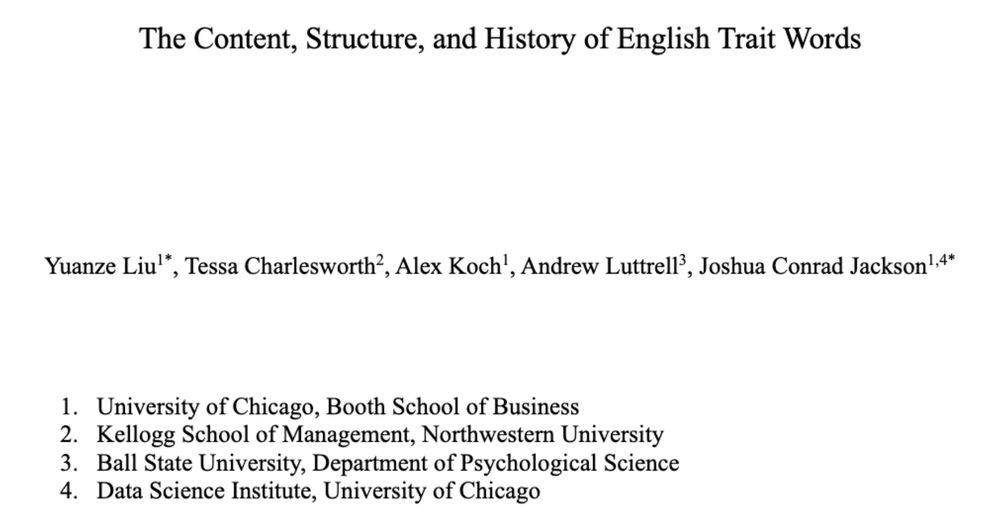
July 22, 2025 at 3:36 PM
English language is filled with trait words like “caring” and “smart”
These words are the currency of personality/social psych, yet key questions remain about their evolution, function, and structure
We take on these questions in a preprint led by @yuanzeliu.bsky.social
osf.io/preprints/ps...
These words are the currency of personality/social psych, yet key questions remain about their evolution, function, and structure
We take on these questions in a preprint led by @yuanzeliu.bsky.social
osf.io/preprints/ps...
New preprint! We developed new measurement tools to examine moralization in ~2B Twitter/X & Reddit posts and ~5M traditional media texts.
Key finding: moralization increased markedly on social media from 2013-2021; more than traditional media; associated with multiple user dynamics
🧵👇
Key finding: moralization increased markedly on social media from 2013-2021; more than traditional media; associated with multiple user dynamics
🧵👇

July 22, 2025 at 3:37 PM
New preprint! We developed new measurement tools to examine moralization in ~2B Twitter/X & Reddit posts and ~5M traditional media texts.
Key finding: moralization increased markedly on social media from 2013-2021; more than traditional media; associated with multiple user dynamics
🧵👇
Key finding: moralization increased markedly on social media from 2013-2021; more than traditional media; associated with multiple user dynamics
🧵👇
Reposted by Curtis Puryear
Thanks to everybody who chimed in!
I arrived at the conclusion that (1) there's a lot of interesting stuff about interactions and (2) the figure I was looking for does not exist.
So, I made it myself! Here's a simple illustration of how to control for confounding in interactions:>
I arrived at the conclusion that (1) there's a lot of interesting stuff about interactions and (2) the figure I was looking for does not exist.
So, I made it myself! Here's a simple illustration of how to control for confounding in interactions:>
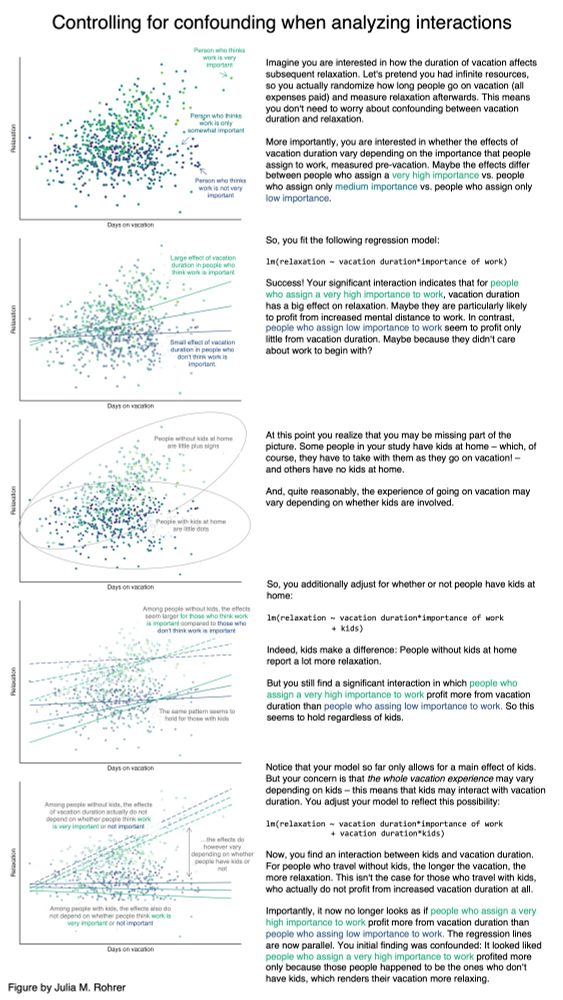
May 11, 2025 at 5:34 AM
Thanks to everybody who chimed in!
I arrived at the conclusion that (1) there's a lot of interesting stuff about interactions and (2) the figure I was looking for does not exist.
So, I made it myself! Here's a simple illustration of how to control for confounding in interactions:>
I arrived at the conclusion that (1) there's a lot of interesting stuff about interactions and (2) the figure I was looking for does not exist.
So, I made it myself! Here's a simple illustration of how to control for confounding in interactions:>
Reposted by Curtis Puryear
Is America an oligarchy?
Bernie and AOC say yes, touring the country to “Fight Oligarchy.” Other Democratic leaders aren’t so sure.
With the debate heating up, I wanted to share a few insights from our recent paper on who’s funding American politics. 🧵 cup.org/4cfm0Az
Bernie and AOC say yes, touring the country to “Fight Oligarchy.” Other Democratic leaders aren’t so sure.
With the debate heating up, I wanted to share a few insights from our recent paper on who’s funding American politics. 🧵 cup.org/4cfm0Az
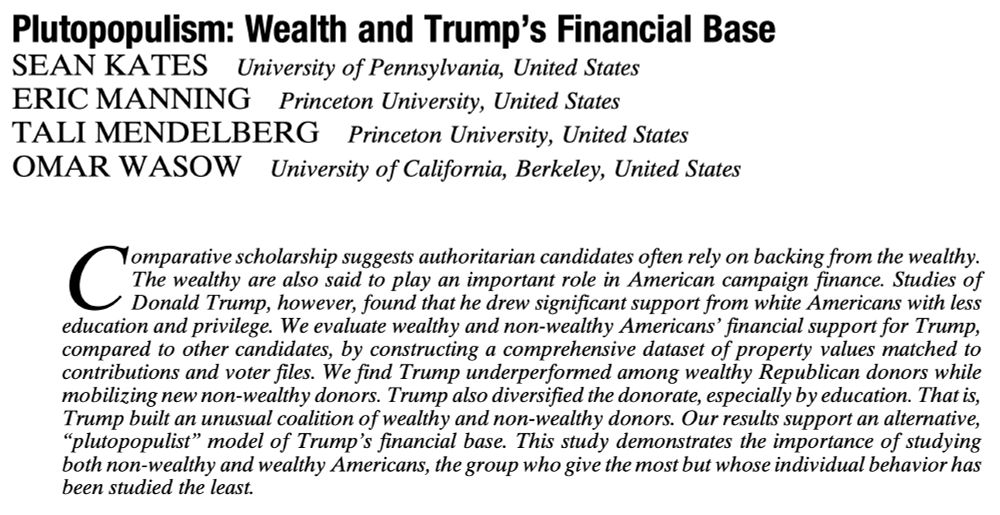
May 4, 2025 at 4:31 PM
Is America an oligarchy?
Bernie and AOC say yes, touring the country to “Fight Oligarchy.” Other Democratic leaders aren’t so sure.
With the debate heating up, I wanted to share a few insights from our recent paper on who’s funding American politics. 🧵 cup.org/4cfm0Az
Bernie and AOC say yes, touring the country to “Fight Oligarchy.” Other Democratic leaders aren’t so sure.
With the debate heating up, I wanted to share a few insights from our recent paper on who’s funding American politics. 🧵 cup.org/4cfm0Az
Reposted by Curtis Puryear
Were wealthy donors key to Trump’s campaigns in 2016 and 2020?
I'm thrilled to announce a new paper in which Sean Kates, Eric Manning, Tali Mendelberg and I analyzed data on 108 million (!) homeowner-voters.
See “Plutopopulism: Wealth and Trump’s Financial Base.” Open access: cup.org/4cfm0Az 🧵 1/
I'm thrilled to announce a new paper in which Sean Kates, Eric Manning, Tali Mendelberg and I analyzed data on 108 million (!) homeowner-voters.
See “Plutopopulism: Wealth and Trump’s Financial Base.” Open access: cup.org/4cfm0Az 🧵 1/

April 16, 2025 at 4:37 PM
Were wealthy donors key to Trump’s campaigns in 2016 and 2020?
I'm thrilled to announce a new paper in which Sean Kates, Eric Manning, Tali Mendelberg and I analyzed data on 108 million (!) homeowner-voters.
See “Plutopopulism: Wealth and Trump’s Financial Base.” Open access: cup.org/4cfm0Az 🧵 1/
I'm thrilled to announce a new paper in which Sean Kates, Eric Manning, Tali Mendelberg and I analyzed data on 108 million (!) homeowner-voters.
See “Plutopopulism: Wealth and Trump’s Financial Base.” Open access: cup.org/4cfm0Az 🧵 1/
Reposted by Curtis Puryear
New study analyzed 145 years of U.S. congressional speeches and found a clear shift away from evidence-based language toward more intuition-based language—especially since the mid-1970s.
www.nature.com/articles/s41...
www.nature.com/articles/s41...

Computational analysis of US congressional speeches reveals a shift from evidence to intuition - Nature Human Behaviour
This research explores the linguistic traces of evidence-based reasoning and intuitive decision-making in congressional speeches from 1879 to 2022. The analysis suggests that evidence-based language h...
www.nature.com
April 13, 2025 at 2:25 PM
New study analyzed 145 years of U.S. congressional speeches and found a clear shift away from evidence-based language toward more intuition-based language—especially since the mid-1970s.
www.nature.com/articles/s41...
www.nature.com/articles/s41...
Reposted by Curtis Puryear
New paper by @kunstjonas.bsky.social & Mesoudi on acculturation.
journals.sagepub.com/doi/epub/10....
A must read!
journals.sagepub.com/doi/epub/10....
A must read!
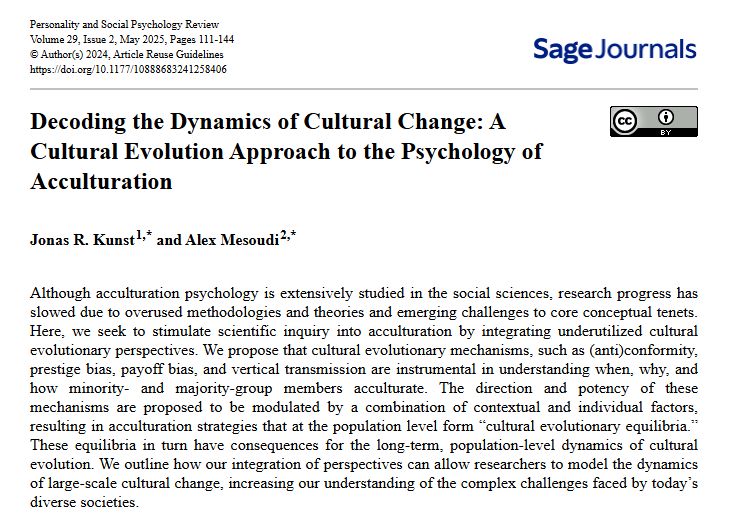
April 2, 2025 at 1:23 PM
New paper by @kunstjonas.bsky.social & Mesoudi on acculturation.
journals.sagepub.com/doi/epub/10....
A must read!
journals.sagepub.com/doi/epub/10....
A must read!
Reposted by Curtis Puryear
Really proud of this new work out @psychscience.bsky.social. Led by the amazing but bluesky-less Amanda Geiser and with @deborahsmall.bsky.social.
We show that when comparing moral wrongs, people are (much) more willing to “scale up” than to “scale down” condemnation and punishment…
We show that when comparing moral wrongs, people are (much) more willing to “scale up” than to “scale down” condemnation and punishment…

March 22, 2025 at 6:20 PM
Really proud of this new work out @psychscience.bsky.social. Led by the amazing but bluesky-less Amanda Geiser and with @deborahsmall.bsky.social.
We show that when comparing moral wrongs, people are (much) more willing to “scale up” than to “scale down” condemnation and punishment…
We show that when comparing moral wrongs, people are (much) more willing to “scale up” than to “scale down” condemnation and punishment…
Reposted by Curtis Puryear
The most successful person-to-person politically persuasive messages are those that bridge identity divides, use perspective taking, and incorporate personal narratives, finds @naunovmartin.bsky.social Ruedo-Cañòn @tjryan02.bsky.social in @thejop.bsky.social www.journals.uchicago.edu/doi/10.1086/...



March 14, 2025 at 3:38 PM
The most successful person-to-person politically persuasive messages are those that bridge identity divides, use perspective taking, and incorporate personal narratives, finds @naunovmartin.bsky.social Ruedo-Cañòn @tjryan02.bsky.social in @thejop.bsky.social www.journals.uchicago.edu/doi/10.1086/...

